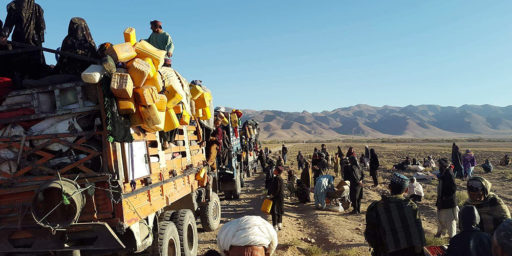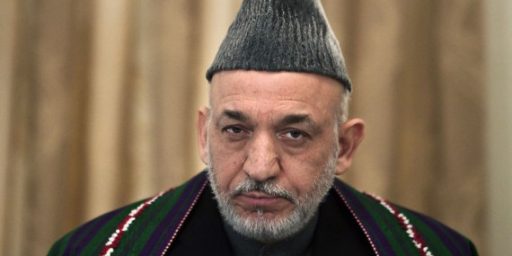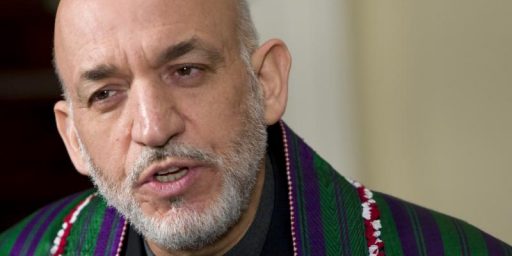Karzai Losing Support
Afghan leader Hamid Karzai is in big trouble, reports Pam Constable in a front page story in today’s WaPo.
Many Afghans and some foreign supporters say they are losing faith in President Hamid Karzai’s government, which is besieged by an escalating insurgency and endemic corruption and is unable to protect or administer large areas of the country. As a sense of insecurity spreads, a rift is growing between the president and some of the foreign civilian and military establishments whose money and firepower have helped rebuild and defend the country for nearly five years. While the U.S. commitment to Karzai appears solid, several European governments are expressing serious concerns about his leadership. “The president had a window of opportunity to lead and make difficult decisions, but that window is closing fast,” said one foreign military official in Kabul who, like others, spoke on the condition of anonymity because of the sensitivity of the subject. “This is a crucial time, and there is frustration and finger-pointing on all sides,” the official said. “President Karzai is the only alternative for this country, but if he attacks us, we can’t help him project his vision. And if he goes down, we all go down with him.”
In markets and mosques across the country, Afghans are focusing discontent on Karzai, 48, the amiable, Western-backed leader whose landslide election in October 2004 appeared to anchor a process of political reconstruction and stability that began with the U.S.-led overthrow of the Taliban in late 2001. Since then, public confidence in his leadership has soured with reports of highway police robbing travelers, government jobs sold to the highest bidder, drug traffic booming and aid money vanishing. There are no public opinion polls here, but several dozen Afghan and foreign observers expressed similar views.
Having to rely on anecdotal accounts is problematic, but Constable has been reporting out of Afghanistan for years now and should have a pretty solid sense of the atmosphere.
Since April, an aggressive Taliban offensive across the south has resulted in the deaths of 600 people. In the past four days, more than 150 insurgents have been reported killed in battles with Afghan and foreign troops in the southern provinces of Uruzgan and Kandahar. Late last month, a riot in Kabul, in which protesters attacked foreign facilities for hours as police vanished from the streets, raised concerns among many people here that the government is too weak to protect even the capital.
[…]
Karzai and his advisers have taken bitter umbrage at the criticism, saying they have tried their best to govern and secure the country under nearly impossible conditions. They accuse their foreign allies of unfairly blaming the president for problems he did not create. At a news conference Thursday, Karzai strongly criticized his government’s foreign allies, saying they had long ignored his pleas for more help to build the nation’s security forces. He suggested that they needed to make a “strategic reassessment” of the anti-insurgent fight here and look to causes beyond Afghanistan’s borders. The president has previously accused Pakistan of harboring and aiding insurgents. Karzai bristled at international criticism that greeted his recent naming of 13 police officials, some of whom have been accused of human rights abuses. “This is our decision, and what we do is suitable for Afghanistan,” Karzai said.
Foreign officials and analysts said the appointments went directly against their advice and were made on the basis of ethnic and political balance, rather than professional qualifications. Some feared they also were a sign of Karzai’s submission to powerful opponents who seek to destabilize his government. “This shows a bazaar mentality toward governing,” said a European official who spoke on the condition of anonymity. “He’s making decisions for short-term stability that go against his own interests and the long-term interests of building the country. As a result, international support for him is eroding, and it could become a real rift at the worst possible time.”
Well, it is the Middle East.
While no one is suggesting that any imminent withdrawal of foreign military or economic support is likely, some European governments — which do not share Washington’s investment in Afghanistan as a role model for a modern Muslim democracy — have begun to question the wisdom of costly long-term economic commitments and the risk of ongoing high battlefield casualties. “There is an awful feeling that everything is lurching downward,” said a Western diplomat, speaking on the condition of anonymity. “Nearly five years on, there is no rule of law, no accountability. The Afghans know it is all a charade, and they see us as not only complicit but actively involved. You cannot fight a terror war and build a weak state at the same time, and it was a terrible mistake to think we could.”
What, precisely, were the alternatives? Not fighting the terrorists? Not trying to build a stable government?
Karzai’s top priority had been to unite a country that was deeply fragmented after years of civil war and repressive Islamic rule, said Jawed Ludin, Karzai’s chief spokesman. That goal sometimes has meant compromising with adversaries in ways that might appear weak to outsiders. “We acknowledge there have been failures of governance, of police reforms, of institution-building. But the main problem is terrorism,” Ludin said. “We know people are unhappy, but it is very unhelpful for our friends to blame him personally for the problems of a country that is crippled and starting from scratch.”
The parallels with Iraq are obvious as well. In both cases, the attempt at democratization combined with counterinsurgency is an uphill fight. Afghanistan was even more backward and, arguably, the Taliban were even more brutal than Saddam’s Baathist regime. Interestingly, however, the Europeans blame the locals for the inability to make things work in Afghanistan while they blame the Bush administration for not making it work in Iraq. In both cases, the expectation of quick success is incredibly unreasonable.






Karzai always seemed almost too amiable. What made him seem widely acceptable and ideal initially may have turned out to be a weakness. Go figure.
yeah, blame karzai…it’s not the bush administrations fault for “cutting and running” off to iraq before they finished the job at hand. nope…it’s that damn karzai. there is just no f’ing accountibility.
Perhaps if we had sent 150K troops to Afghanistan instead of…elsewhere… things would going a bit smoother by now. You know, roads, schools, electricity and no good reason for Taliban support by the population since we would have brought something more tangible (and edible) than “democracy” into their lives. We might even have the real Boogyman in custody by now (Up in the hills it’s a bit difficult to tell the difference between southern Afghanistan and northern Pakistan, especially in the midst of a hot pursuit.)
Well karzai did have the most important qualification…he worked for exxon and thus was easy to manipulate even if he had no political experience
Afghanistan is technically not part of the MIddle East. Its more properly called South Asia.
Cutting and Running to Iraq, you guys kill me. Dont send troops to Iraq, maybe we need more there, if only we sent more here…make up your mind